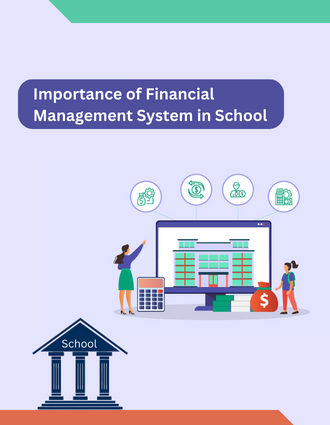One crucial component of the educational process is the school’s financial and administrative operations. The effectiveness of the school’s financial and administrative operations determines the success of the educational process.
Therefore, to facilitate the error-free finance management system of schools, personnel in charge of administrative and financial work must become familiar with its history, regulations, and current technological advancements. We’ll discuss the significance of financial management systems in schools in this article. Let’s dive!
Financial Management for Schools – An Overview
The finance management system guidelines for achieving financial gains are known as financial management, and they play a major role in securing funds for educational institutions as well as completing organizational tasks. Planning every financial transaction to maximize profits is part of this process.
Organizations must make the essential choices that the school plan relies on to maximize benefits and offer pupils opportunities as well as long-term financial gain. In addition to obtaining accurate findings, profit rates and an understanding of all potential losses in the future are also important.

What Is the Need to Set Up Financial Management in Schools?
Achieving harmony within the educational institution, adhering to regulations, reaching and supporting different judgments, and creating strategies for the rotation and use of funds within the facility are among the most crucial responsibilities of financial management.
Efficiency and dependency between the various departments and any developments that take place in this department are also achieved by the school’s financial management. Favorably impacted the remaining departments. Several aspects can be used to summarize the significance of financial management organization in payment management in school; the most common ones include:
1. Simplifies Financial Decisions for the School
Financial departments facilitate financial decision-making inside the school, but decisions must be made correctly to avoid having an impact on the entire organization.
2. Ensures the School’s Financial Security
The financial management sector protects the payment management system, makes informed decisions, keeps an eye on them, and funds certain essential activities. These are known to be inclusive and are among the top priorities of the financial management department of the educational institution.
3. Boosts School’s Efficiency
Efficient financial management facilitates the expansion of the school administration both financially and economically. This right growth of the administration raises the amount of cash provided to the school and yields the intended profit.
Top-Notch Benefits of Financial Management Systems in School
The organizational significance of financial management in schools resides in its capacity to promote unity within the learning environment, bolstering different choices and augmenting departmental efficiency.
It is critical to preserve finances, make financial decisions simple, and support the school’s financial expansion and production. Accurate control over school funds is maintained by the implementation of payment management in the School Program, which includes all necessary accounting items and features.
Financial management is essential to corporate success, guiding it toward long-term growth. This broad field includes functions and strategies to efficiently use and allocate financial resources. We examine the many effects of financial management on businesses in this study.
1. Strategic Financial Planning
Financial management’s contribution to financial planning is key. Financial management guides organizations to forecast their financial needs and commitments and match financial strategies with company goals. Foresight is essential for building a thorough budgetary plan for the firm.
2. Fund Acquisition: Strategic Capital Engagements
Financial management is crucial to funding planning and acquisition. Organizations need lots of money for expansion, R&D, and daily operations. Effective financial management helps find funding sources and create methods to get it. This is crucial for firms to have the financial resources to overcome difficulties and seize opportunities in a changing business environment.
3. Effective Use and Allocation: Performance Optimization
After acquiring funds, the payment management system influences their efficient use and allocation. Optimizing organizational performance requires strategic investment, expenditure, and resource distribution decisions. Efficient money allocation promotes fiscal responsibility by ensuring that each financial decision supports the organization’s goals.
4. Making Critical Financial Decisions With Informed Choices
Organizational operations require critical financial decisions, and financial management guides these decisions. Solid financial management provides the analytical framework needed to make strategic decisions about project viability, investment opportunities, and financial risks. This improves decision-making and reduces financial risks.
5. Profitability Enhancement: Success Strategy Alignment
Financial management affects an organization’s profitability beyond planning and decision-making. Organizations can boost revenue and reduce costs by coordinating financial and operational strategies. This proactive approach sustains profitability and financial resilience in a competitive environment.
6. Increased Organizational Value: Stakeholder Value
An effective finance management system boosts a firm or organization’s value beyond profitability. Investors, stakeholders, and creditors typically value a company based on its financial health. Effective financial management, including cautious decision-making and strategic financial planning, boosts the organization’s perceived worth to stakeholders.
7. Economic stability: Regional macro impact
Financial management affects macroeconomic stability regionally. Well-run organizations promote stability, employment, and community development, improving a region’s economy.
8. Employee Well-being: Financial Responsibility
Financial management encourages personal financial planning, which benefits employees. Employee savings programs and financial education promote financial responsibility in employees. This improves employee well-being, workplace satisfaction, and productivity.
How Many Schools Profit From Financial Management Automation?
Along with efficient resource management, the Financial Management System seeks to streamline the intricate financial operations of schools. Effective resource management for the organization is also guaranteed by the system.
Massive amounts of financial data from the “Accounts Receivable System” can be analyzed by the financial management system. Also, it can assist in eliminating time-consuming operations like data imports and exports.
Bottom Line
To sum up, the significance of having a strong Proctur Fees Management System in schools cannot be emphasized because it is essential to the effectiveness of the learning process. To maintain effective and error-free financial management, school management systems, and financial tasks must change along with the educational landscape.
To this end, they must embrace contemporary technologies. The definition of financial management in education emphasizes the importance of this position in generating financial gains, securing funding, and making well-informed decisions that will ultimately benefit students and the school.



